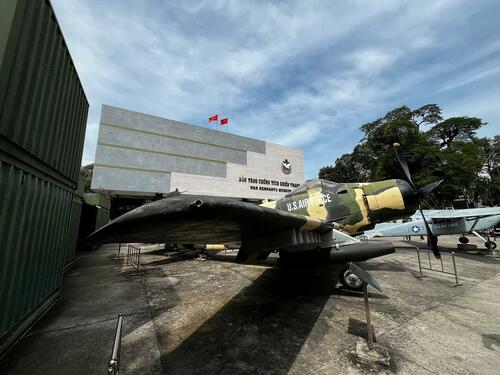I have been a huge fan of Vietnam and its people ever since my first visit 25 years ago. It is a truly special place, which is why I recently returned for the first time since the Covid pandemic. While Vietnam’s charm and uniqueness remain unchanged, this visit felt different. I have explored the Cu Chi Tunnels, the War Remnants Museum, and observed daily life in Vietnam many times before, but this time felt different. Perhaps because Trump had just been re-elected, offering a renewed possibility for change and peace, I found myself repeatedly reflecting on the Vietnam War—especially on the lessons it should have taught us about the ongoing conflict in Ukraine.
The War Remnants Museum in Saigon, in particular—filled with military equipment left behind by the United States—is a place that everyone should try to visit at least once. It stands as a powerful testament not only to the immense human cost of war—something all war museums convey—but also to the particular senselessness of the Vietnam War.
The centerpiece of the War Remnants Museum is its collection of abandoned American military equipment, and for good reason. These relics powerfully convey the museum’s core message: the folly of intervening in a distant conflict with inadequate understanding, engaging in extensive bombing, and then retreating when plans fail, leaving chaos behind. Yet, there’s no sense of triumph or gloating. The abandoned equipment speaks for itself. If blame is assigned at all, it points to the corrupt South Vietnamese leadership, while the United States is portrayed more as a misguided participant—entangled in a conflict it neither understood nor should have joined in the first place.
In the same vein, what struck me most during my visit, and not for the first time, was the remarkable warmth and kindness that the Vietnamese people extend toward foreigners, particularly Americans. This contrast between past conflict and present-day hospitality not only highlights the resilience and forgiveness of the Vietnamese people but also underscores the profound tragedy of the conflict. The pain and suffering endured appear even more tragic when contrasted with the reality that these two nations never needed to have confronted each other at all.
The Vietnam War was, at its core, a struggle for independence and self-determination. From the American perspective, however, it became a quagmire of fundamental misunderstandings and strategic missteps. Often overlooked amidst conflicting narratives is the fact that, after enduring a century of French colonial rule, the Vietnamese people’s foremost priority was achieving independence. Foreign intervention, regardless of intent, was unlikely to succeed in such a context. The United States’ failure to grasp this reality led to its involvement in a conflict that was both senseless and unwinnable. But, driven by exaggerated Cold War fears, much like media narratives shaping discussions of the ongoing war in Ukraine, the United States chose to intervene. […]
— Read More: www.zerohedge.com
What Would You Do If Pharmacies Couldn’t Provide You With Crucial Medications or Antibiotics?
The medication supply chain from China and India is more fragile than ever since Covid. The US is not equipped to handle our pharmaceutical needs. We’ve already seen shortages with antibiotics and other medications in recent months and pharmaceutical challenges are becoming more frequent today.
Our partners at Jase Medical offer a simple solution for Americans to be prepared in case things go south. Their “Jase Case” gives Americans emergency antibiotics they can store away while their “Jase Daily” offers a wide array of prescription drugs to treat the ailments most common to Americans.
They do this through a process that embraces medical freedom. Their secure online form allows board-certified physicians to prescribe the needed drugs. They are then delivered directly to the customer from their pharmacy network. The physicians are available to answer treatment related questions.


